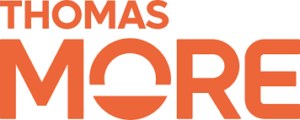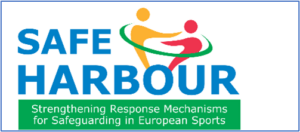Thomas More is pleased to be a partner in the new Erasmus+ Project named “Strengthening Response Mechanism for Safeguarding in European Sports” (SAFE HARBOUR), which is coordinated by the European Olympic Committees EU Office (EOC EU Office). This initiative is dedicated to enhancing safeguarding mechanisms across European sport, creating safer environments for all.
About Thomas More

Thomas More University of Applied Sciences (Belgium) is Flanders’ largest institution of higher education and holds an international reputation. Thomas More maintains active participation in global networks and projects that complement the diverse academic programs and research initiatives/domains. Within the People and Well-being research group, the Safeguarding Sport and Society team specialises in developing and evaluating evidence-based interventions to prevent interpersonal violence in sport. Their core tasks are centered around conducting prevalence studies and developing, evaluating, and implementing bystander interventions and policy instruments to safeguard children and young adults in sport and other social settings.
The work of Thomas More on safeguarding in sports to date
The Safeguarding Sport and Society team has established a remarkable track record of achievements in child safeguarding in sport and implementing bystander interventions. Their pioneering research on interpersonal violence against children in European sport has influenced legislative changes in several EU Member States. The team’s involvement in the Erasmus+ VOICE project resulted in the publication of the book 'Foulplay: sexual violence in youth sport' and the establishment of the survivor network Voices in Sport Belgium in 2019. Furthermore, as coordinator of the Erasmus+ Safe Sport Allies (SSA) project, the team has successfully developed and implemented evidence-based bystander prevention tools, reaching over 500 local sport club members, with resources available in multiple languages. This project also led to the Erasmus+ Safe Para Sport Allies project, in which the SSA bystander workshop for coaches was adapted and evaluated to the context of coaching working with sport participants with a disability. Finally, the Safeguarding Sport and Society team is currently leading the Safe Football project, funded by the Oak foundation, in which they aim to develop an evidence-based safeguarding program tailored to the Belgian elite youth football community.
The role of Thomas More within the SAFE HARBOUR project
As a leading expert in safeguarding, Thomas More will play a pivotal role in the SAFE HARBOUR project. Responsibilities include designing and conducting questionnaires to assess current safeguarding practices, identifying service gaps, and creating an online database to map key stakeholders in each partner country. Thomas More will also lead the delivery of seven thematic seminars, ensuring they align with human rights and legislative frameworks. Moreover, the institution will develop templates for National Strategies, conduct workshops, and provide tailored support to partners in designing and implementing their strategies. Thomas More’s contributions will extend to creating a Master Presentation and delivering “Training of the Trainers” sessions to ensure the sustainability and effectiveness of the safeguarding measures implemented.
Background information on the SAFE HARBOUR project
The SAFE HARBOUR project, short for “Strengthening Response Mechanisms for Safeguarding in European Sport”, is a 30-month project co-funded by the European Union through the Erasmus+ Sport Programme 2024. Coordinated by the EOC EU Office, the consortium includes Thomas More and Asser Institute as experts on safeguarding, human rights and law, 2 International Federations (International Biathlon Union and International Ice Hockey Federations), and 20 National Olympic Committees (Belgium, Bosnia and Herzegovina, Croatia, Cyprus, Czechia, Denmark, Germany, Hungary, Kosovo, Latvia, Lithuania, Luxembourg, Malta, Montenegro, Norway, Poland, Portugal, Romania, Slovakia and Slovenia). Additionally, the International Olympic Committee (IOC) is involved as an outside resource.
The project seeks to strengthen the capacity of European NOCs and Federations to address safeguarding concerns by identifying gaps, developing a European Response framework, and fostering collaboration. This framework will be adapted to national contexts, complemented by training and awareness initiatives to enhance safeguarding measures at both national and European levels. Therefore, SAFE HARBOUR aims to equip partner NOCs and Federations with the tools and confidence to implement effective safeguarding measures while establishing a robust support network for Safeguarding Officers and laying the groundwork for a future IOC Regional Safeguarding Hub.

![]()
